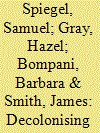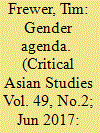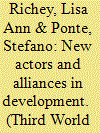| Srl | Item |
| 1 |
ID:
151497


|
|
|
|
|
| Summary/Abstract |
Academics in high-income countries are increasingly launching development studies programmes through online distance learning to engage practitioner-students in low-income countries. Are such initiatives providing opportunities to critically tackle social injustice, or merely ‘mirroring’ relations of global inequality and re-entrenching imperial practices? Building on recent scholarship addressing efforts to ‘decolonise development studies’ and the complex power dynamics they encounter, we reflect on this question by analysing experiences of faculty and students in a United Kingdom-based online development studies programme, focusing particularly on perspectives of development practitioner-students working from Africa. We discuss barriers to social inclusivity – including the politics of language – that shaped participation dynamics in the programme as well as debates regarding critical development course content, rethinking possibilities for bridging counter-hegemonic development scholarship with practice-oriented approaches in a range of social contexts. Our analysis unpacks key tensions in addressing intertwined institutional and pedagogic dilemmas for an agenda towards decolonising online development studies, positioning decolonisation as a necessarily unsettling and contested process that calls for greater self-reflexivity.
|
|
|
|
|
|
|
|
|
|
|
|
|
|
|
|
| 2 |
ID:
152197


|
|
|
|
|
| Summary/Abstract |
Cambodia’s mountainous northeastern province of Ratanakiri, which only twenty years ago was home to mainly indigenous minority groups largely focused on subsistence production, has undergone rapid ecological, social, and economic transformation. Deforestation and land alienation in the context of large-scale plantation agriculture, land speculation, and smallholder cash cropping have led to concerns that indigenous communities are being alienated from their land and not benefitting from economic changes. This has resulted in a significant number of NGO and government programs that attempt to protect and “empower” indigenous people, particularly women. This article examines a one-year research project which explored the relationship between indigenous women and land change in two indigenous villages. It discusses how indigenous women as well as Khmer and landless Cham immigrants have dealt with the commoditization of land and labor. It focuses on the differentiated way capitalist relations have pushed men, women, landless laborers, and increasingly wealthy landowners on increasingly divergent life trajectories. Compelled by donors to focus on gender and indigenous women as an object of governance, the NGO that directed this project struggled to keep up with the realities of capitalist relations on the ground.
|
|
|
|
|
|
|
|
|
|
|
|
|
|
|
|
| 3 |
ID:
128460


|
|
|
|
|
| Publication |
2014.
|
| Summary/Abstract |
New actors and alliances in development' brings together an interdisciplinary group of scholars exploring how development financing and interventions are being shaped by a wider and more complex platform of actors than usually considered in the existing literature. The contributors also trace a changing set of key relations and alliances in development - those between business and consumers; ngos and celebrities; philanthropic organisations and the state; diaspora groups and transnational advocacy networks; ruling elites and productive capitalists; and 'new donors' and developing country governments. Despite the diversity of these actors and alliances, several commonalities arise: they are often based on hybrid transnationalism and diffuse notions of development responsibility; rather than being new per se, they are newly being studied as practices that are now coming to be understood as 'development'; and they are limited in their ability to act as agents of development by their lack of accountability or pro-poor commitment. The articles in this collection point to images and representations as increasingly important in development 'branding' and suggest fruitful new ground for critical development studies.
|
|
|
|
|
|
|
|
|
|
|
|
|
|
|
|